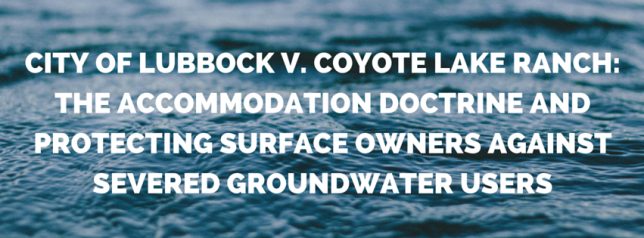By Ross Smith, Articles Editor.
Supreme Court of Texas Justice Don Willett once quoted James Michener when he stated, “Water, not oil, is the lifeblood of Texas . . .” and as such, water, including groundwater, will only continue to become more important commercially and domestically in the state.[1] Justice Willett and his colleagues on the Texas Supreme Court now have an opportunity to analyze the importance of water in Coyote Lake Ranch v. City of Lubbock, a case presenting questions about the accommodation doctrine’s application to disputes between groundwater owners and surface owners.[2]
Although some might argue that the energy industry is king in Texas, and therefore more important than any surface use, it is equally important to note that “Texas leads the nation in cattle, cotton, hay, sheep, goats and mohair production.”[3] Quietly, through the agricultural sector and water marketers, groundwater has become an economic force and “[a]lthough today the price of crude oil is hundreds of times more valuable than the price of municipal water, the price of bottled water is roughly equivalent to, or in some cases, greater than the price of oil.”[4] Although responsible production of groundwater needs to be encouraged, those who own surface rights, and have a severed groundwater owner producing on their land need to be protected from that severed groundwater owner’s actions.[5]
Since the Getty Oil Co. v. Jones decision in 1971, surface owners have been afforded protection from severed mineral owners operating on their land in the form of the accommodation doctrine, but no such protection has been extended to surface owners against severed groundwater owners.[6] Currently, protections in groundwater law remain underdeveloped compared to oil and gas law and stand out of balance due to the emphasis placed on oil and gas because of its historical pervasiveness over large areas of Texas.
The accommodation doctrine was originally created for, and historically only applied to, severed mineral owners as a way to balance the rights of the dominant mineral estate and servient surface estate.[7] It is a way for the courts to recognize that although the mineral estate is dominant, it must exercise its rights with “due regard” to the rights of the surface owner by identifying if a mineral lessee has a reasonable alternative to a course of action that will interfere with an existing surface use.[8] Absent a statutory provision, “the best legal protection afforded the farmer and rancher is the accommodation doctrine.”[9] Currently, a surface owner has to prove three elements to win on an accommodation doctrine claim:
- There is an existing use by the surface owner;
- The mineral lessee’s activity would substantially impair the existing surface use; and
- The mineral lessee has a reasonable alternative available on the leased premises.[10]
It is with this backdrop that Coyote Lake Ranch, a surface owner, began its battle against the City of Lubbock, the groundwater rights owner under the Ranch. The Ranch itself contains about 26,600 acres and is mainly used for cattle ranching, farming, and hunting.[11] The soil on the ranch is extremely sandy, and activities on its surface can lead to “blow outs”—a phenomena where, once the sand begins to blow, it causes more sand to blow and destroys vast swathes of the ranch.
The City of Lubbock bought all the groundwater rights to Coyote Lake Ranch property in 1953. Undoubtedly, in 1953, the seller could not have envisioned that the city would seek to place 80 groundwater wells throughout the ranch as evidenced by the well field plan that was recently disclosed by the City. Recently, the City began installing groundwater wells on the Ranch according to its plan. The Ranch, fearing that Lubbock’s well field activity would do incredible, irreversible harm to the surface estate, moved to enjoin the City from conducting the activity based on the accommodation doctrine. To effectuate the well field plan, the City of Lubbock mowed down large areas of the ranch to make room for water wells, and the City’s activity has already led to some blow outs. In addition, once mowed, the area was no longer usable for cattle.
The Seventh Court of Appeals of Texas, after a brief discussion of the accommodation doctrine, refused to apply the doctrine because it had never been applied in a case of a severed groundwater estate owner.[12] To justify its holding, the court reasoned that groundwater is part of the surface estate, and therefore not dominant to the surface estate. Consequently, the court concluded the surface owner did not need the protection afforded by the accommodation doctrine, but also stated that should the doctrine be expanded, the Texas Supreme Court or the Legislature should be the ones to do it. The Supreme Court of Texas granted the Coyote Lake’s petition for review of the case, and now has an opportunity to provide another needed protection to surface owners against sub-surface owner’s activities.
The Supreme Court of Texas should reframe the legal application and understanding of the accommodation doctrine. Instead of applying it in the context of dominant versus servient estates, it should look at the doctrine in terms of surface estate being harmed by a severed sub-surface owner. In that way, the doctrine would be more applicable to the changing environmental and social conditions Texas is currently experiencing. These changes over time are the same that have influenced oil and gas and water law historically.[13] Then, the accommodation doctrine could be applied to groundwater development projects, or more broadly to any other future sub-surface activities that might interfere with a surface owner uses.
Although applying the accommodation doctrine to limit the activities of a severed groundwater owner might have “dramatic implications” for water law, the benefits afforded to protecting surface owners would far outweigh any potential detriment to the current relationship severed groundwater owners have with their surface owner counterparts. [14] Without effective agency regulation on groundwater, the accommodation doctrine becomes even more important for landowners who have severed groundwater owners acting on their land.
Due to changing economic and social conditions, an expanded accommodation doctrine would be more in line with public opinion in the state of Texas.[15] Also, any continued expansion of the accommodation doctrine would do little to disrupt the balance between the mineral estate and surface estate due to the level of dominance the mineral estate currently enjoys over the surface estate based on the right of ingress and egress that a mineral interest carries with it.
Texas has been a leader in oil and gas jurisprudence for many years. Most other states look to Texas oil and gas law when developing or changing their own.[16] The accommodation doctrine itself was a Texas creation, and many other states subsequently adopted the doctrine for their own use following Texas’s lead.[17] If Texas wants to hold its title as a national leader, it needs to strive to continue modernizing its laws to adapt to current conditions. Since the accommodation doctrine’s introduction, other states have adopted surface land use acts that provide for specific damages for oil and gas operator activities on the surface. The Texas Legislature has not adopted any form of a surface land use act. Although these have some benefits, they do not have the flexibility that the accommodation doctrine could afford.[18] By further expanding the doctrine to groundwater production, a surface owner would have protections against the majority of sub-surface activities that involve some form of surface use and destruction.
[1] Coastal Oil & Gas Corp v. Garza Energy Tr., 268 S.W.3d 1, 26 (Tex. 2008) (Willett, J., concurring) (quoting James A Michener, Texas (1985)); see Edmond R. McCarthy, Jr., Mixing Oil and Gas with Texas Water Law, 44 Tex. Tech L. Rev. 883, 938 (2012) (“Water is the key to Texas’s future growth and prosperity.”).
[2] City of Lubbock v. Coyote Lake Ranch, LLC, 440 S.W.3d. 267 (Tex. App.—Amarillo 2014, pet. granted).
[3] Texas Ag Stats, Tex. Dep’t Agric., http://www.texasagriculture.gov/About/TexasAgStats.aspx (last visited Sept. 21, 2015).
[4] Edwards Aquifer Auth. v. Day, 369 S.W.3d 814, 831 (Tex. 2012).
[5] See, e.g., Petitioner’s Brief On the Merits at 21, City of Lubbock v. Coyote Lake Ranch, LLC, 440 S.W.3d 267 (Tex. App.—Amarillo 2014, pet. granted) (No. 14-0472), 2015 WL 1523084, at *21..
[6] See Getty Oil Co. v. Jones, 470 S.W.2d 618, 621–22 (Tex. 1971) (departing from prior law which only required that a mineral estate owner operate with “due regard” to the surface estate because the mineral estate is superior to the surface estate).
[7] See City of Lubbock v. Coyote Lake Ranch, LLC, 440 S.W.3d 267, 272 (Tex. App.—Amarillo 2014, pet. granted).
[8] Trenolone v. Cook Expl. Co., 166 S.W.3d 495, 498 (Tex. App.—Texarkana 2005, no pet.) (citing Getty Oil Co. v. Jones, 470 S.W.2d 618, 621 (Tex. 1971)).
[9] See Ernest E Smith, The Growing Demand for Oil and Gas and the Potential Impact Upon Rural Land, 4 Tex. J. Oil Gas & Energy L. 1, 25 (2008).
[10] See Davis v. Devon Energy Prod. Co., 136 S.W.3d 419, 423 (Tex. App.—Amarillo 2004); see also Tarrant Cnty. Water Control and Imp. Dist. No. One v. Haupt, Inc., 854 S.W.2d 909, 911 (Tex. 1993) (citing Getty Oil Co. v. Jones, 470 S.W.2d 618, 622 (Tex. 1971)).
[11] See Respondent’s Brief on the Merits at 3–4, City of Lubbock v. Coyote Lake Ranch, LLC, 440 S.W.3d 267 (Tex. App.—Amarillo 2014, pet. granted) (No. 14-0572), 2015 WL 3384476, at *4.
[12] Coyote Lake, 440 S.W.3d at 275 (holding that although the Texas Supreme Court analogized groundwater to oil and gas in Edwards Aquifer Auth. v. Day, 369 S.W.3d 814 (Tex. 2012), the accommodation doctrine could not be used to “alter the manner in which the groundwater estate owner may use the surface”).
[13] See Robert A. McCleskey, Maybe Oil and Water Should Mix—At Least in Texas Law: An Analysis of Current Problems with Texas Groundwater law and How Established Oil and Gas Law Could Provide Appropriate Solutions, 1 Tex. Wesleyan L. Rev. 207, 216 (1994).
[14] See Coyote Lake, 440 S.W.3d at 275.
[15] See Jess Davis, Texas Water Access Fight Opens Door for Major Policy Shift, Law360 (Sept. 11, 2015), http://www.law360.com/articles/700720/texas-water-access-fight-opens-door-for-major-policy-shift.
[16] See Andrew M. Miller, A Journey Through Mineral Estate Dominance, the Accommodation Doctrine, and Beyond: Why Texas Is Ready to Take the Next Step with A Surface Damage Act, 40 Hous. L. Rev. 461, 465 (2003).
[17] See Christopher M. Alspach, Surface Use by the Mineral Owner: How Much Accommodation Is Required Under Current Oil and Gas Law?, 55 Okla. L. Rev. 89, 92–105 (2002).
[18] Id. at 118.


